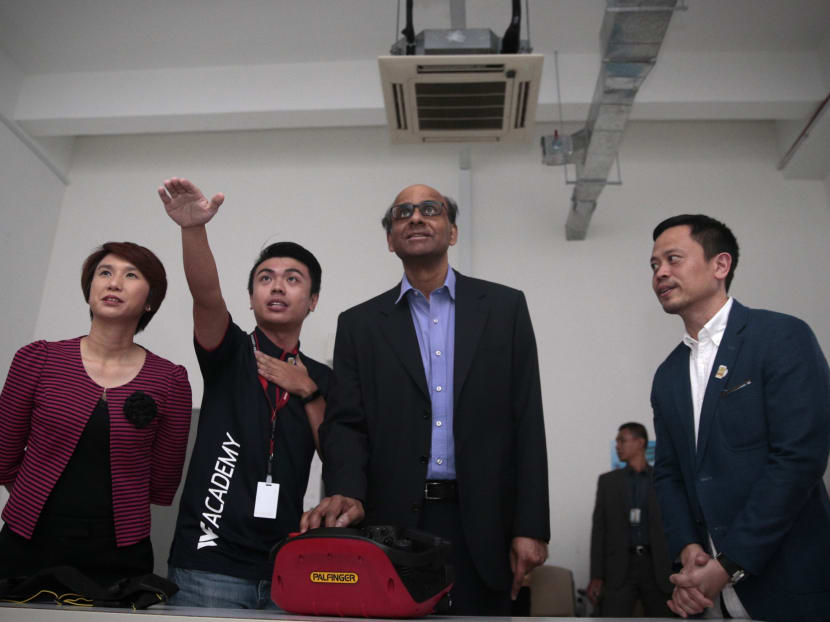Technology will create good mid-level jobs: Tharman
SINGAPORE – Although mid-level jobs will be squeezed out by technology over the next 15 years, plenty of “good jobs” will be created amid the churn and the most fulfilling ones will be those that involve both brains and artistry, Deputy Prime Minister Tharman Shanmugaratnam said yesterday at the McKinsey Innovation Forum.

DPM Tharman Shanmugaratnam tries a crane simulator as he tours the Wong Fong Industries building during its launch event on Sept 28, 2016. TODAY file photo
SINGAPORE – Although mid-level jobs will be squeezed out by technology over the next 15 years, plenty of “good jobs” will be created amid the churn and the most fulfilling ones will be those that involve both brains and artistry, Deputy Prime Minister Tharman Shanmugaratnam said yesterday at the McKinsey Innovation Forum.
“The most rewarding jobs in the future will be those that involve thinking and making, thinking and designing, being on the production floor at the same time that you are leading strategy in an organisation. That’s happening in the whole range of sectors,” Mr Tharman added.
The workforce evolution in the Republic, Mr Tharman said, is happening in “fits and starts”. Of the three-layered workforce pyramid comprising blue-collar workers at the lower end, white-collar in the middle and leadership roles at the top, it is the jobs in the middle that are being squeezed out by technology. However, as businesses upgrade and upskill roles, automation and technology is also giving rise to new job opportunities.
“These are good jobs. In virtually every relatively advanced economy, including the United States, employers are crying out for people to take on the new skilled jobs that are being created … At least for the next 15 years, there are plenty of opportunities for the people to be skilled up to take on the jobs in the middle,” Mr Tharman said in a dialogue session with McKinsey & Company’s Global Managing Partner, Mr Dominic Barton.
The Government will play a key role as businesses transform, he added, and intervene to coordinate and upskill people to ensure the workforce remains democratised and everyone’s ability is enhanced.
The SkillsFuture initiative, accordingly, he said, is about learning throughout life and using the resources of the state to develop employees.
“We are trying to develop that layer now, of people who can advise citizens, people of every stripe, on how they can shape learning to suit their interests and abilities. We are not yet there … We are going to get the culture of learning going — through coordination, closer interaction between leading players in an industry and the rest, and by helping SMEs by subsidising training and by curating learning relevant to them. It is early days but we are making a very determined effort,” Mr Tharman noted.
Turning to the S$4.5-billion Industry Transformation Programme for 23 sectors, Mr Tharman said the aim of the programme is to work with the SMEs and help them to make the most of technology, catch up and converge with frontier companies.
“The major source of inequality in many developed economies is the inequality between firms. The wage differences between firms account for the bulk of inequality. So convergence between companies in adoption of technologies, and in the quality of the jobs, is also a way of addressing social inequality.”






